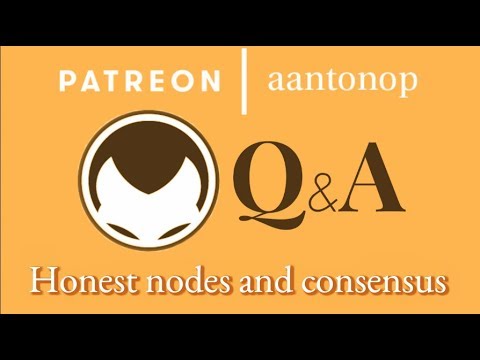How are hashes and transactions determined to be “valid” in Bitcoin? How are nodes determined to be “honest”? How much of this process is automated? Consensus is an agreement on what “valid” is.
These questions are from the MOOC sessions 7.2, 8.2, and 9.2 covering the Byzantine Generals’ Problem, which took place on February 26th 2017, September 15th 2017, and February 23rd 2018 respectively. Andreas is a teaching fellow with the University of Nicosia. The first course in their Master of Science in Digital Currency degree, DFIN-511: Introduction to Digital Currencies, is offered for free as an open enrollment MOOC course to anyone interested in learning about the fundamental principles.
If you want early-access to talks and a chance to participate in the monthly live Q&As with Andreas, become a patron: https://www.patreon.com/aantonop
RELATED:
Consensus Algorithms, Blockchain Technology, and Bitcoin – https://youtu.be/fw3WkySh_Ho
Advanced Bitcoin Scripting Part 1: Transactions and Multisig – https://youtu.be/8FeAXjkmDcQ
Advanced Bitcoin Scripting Part 2: SegWit, Consensus, and Trustware – https://youtu.be/pQbeBduVQ4I
What is Consensus: Rules without Rulers – https://youtu.be/2tqo7PX5Pyc
Forkology: A Study of Forks for Newbies – https://youtu.be/rpeceXY1QBM
Bitcoin: Where the Laws of Mathematics Prevail – https://youtu.be/HaJ1hvon0E0
The rules of Bitcoin (part 1) – https://youtu.be/VnQu4uylfOs
The rules of Bitcoin (part 2) – https://youtu.be/vtIp0GP4w1E
Decentralized power, leaderless governance – https://youtu.be/E5VbDlQTPzU
Scaling, trust, and trade-offs – https://youtu.be/vCxmHwqyJWU
Why running a node is important – https://youtu.be/oX0Yrv-6jVs
Running nodes and payment channels – https://youtu.be/ndcfBfE_yoY
What happens during a fork? – https://youtu.be/XBk8hBJ1xVo
SegWit adoption – https://youtu.be/KCsTVTRk6I4
How do mnemonic seeds work? – https://youtu.be/wWCIQFNf_8g
Andreas M. Antonopoulos is a technologist and serial entrepreneur who has become one of the most well-known and respected figures in bitcoin.
Follow on Twitter: @aantonop https://twitter.com/aantonop
Website: https://antonopoulos.com/
He is the author of two books: “Mastering Bitcoin,” published by O’Reilly Media and considered the best technical guide to bitcoin; “The Internet of Money,” a book about why bitcoin matters.
THE INTERNET OF MONEY, v1: https://www.amazon.co.uk/Internet-Money-collection-Andreas-Antonopoulos/dp/1537000454/ref=asap_bc?ie=UTF8
[NEW] THE INTERNET OF MONEY, v2: https://www.amazon.com/Internet-Money-Andreas-M-Antonopoulos/dp/194791006X/ref=asap_bc?ie=UTF8
MASTERING BITCOIN: https://www.amazon.co.uk/Mastering-Bitcoin-Unlocking-Digital-Cryptocurrencies/dp/1449374042
[NEW] MASTERING BITCOIN, 2nd Edition: https://www.amazon.com/Mastering-Bitcoin-Programming-Open-Blockchain/dp/1491954388
Subscribe to the channel to learn more about Bitcoin & open blockchains!
Music: “Unbounded” by Orfan (https://www.facebook.com/Orfan/)
Outro Graphics: Phneep (http://www.phneep.com/)
Outro Art: Rock Barcellos (http://www.rockincomics.com.br/)
source















4:23 are in-fuck
i like these topic, help me figure out a lot of misunderstood. thanks!
Hi, I have some questions
do the miners validate transactions ?
should the transaction spread across the network until it reaches all the nodes ?
do the nodes conserve the same mempool ?
do miners keep a copy of the mempool?
which inciste nodes to validate transactions ?
finally I want to know what is the difference between a wallet and the Bitcoin client ?
Great content on this video! You are tha man Andreas!
Thanks Andreas
Sorry to be picky. 4:50 should be 2.1 quadrillion and not 21 quadrillion.
u look tired.. take care of yourself 🙂
Andreas: @ 12:13 you said "if it has 6 confirmations" –> why 6? (by the way, great great explanation on nodes and consensus algorithm! 😉 )
You the man! Thanks a lot.
We used to say, "Put it in writing." Now we say,
"Put it in BLOCKCHAIN."
Hi Andreas I just want to give a big shoutout to you from Indonesia! I really hope that you are always well, and you are the voice of the people who does not have a voice. A lot of people are impacted positively in ways no one can imagine indirectly by your work without them ever knowing it! I hope that you will pay a visit to Indonesia, I'd be glad to be your host and bring you around in Jakarta
21 million bitcoins == 21 trillion bits == 2.1 quadrillion satoshis
A big thank you Andreas for all you are doing!
U have a genius brain and u look really tired. Think u need a rest and recharge. Plug in and charge me alien robot
Y r u now saying “ bitcoin core”.Im confused
How do other nodes verify that the hash of a new block actually came from solving an algorithm rather than someone typing a bunch of characters that collectively constitute a number below the target difficulty?
BITCOIN SURGES ANDREAS ANTONOPO.. KEEP UP THE GOOD WORK .BUSY MAN GET THINGS DONE .
4:22 LOL
Thanks for the great answers as always.
So MSM is a Sybil Attack
I wonder who can possibly dislike this video? Great info, solid answers. Thank you!
who the F gave that thumb down. ….pendejo
Whats the difference between running a full node on public ip and non public? As far as u understand this, all those 100k passive nodes are behind ISP ip and are not visible for others, so 100k nodes are just downloading all info from that 15k visible nodes?
How can we check the trx status in full node wallet? I dont see there any option for that..
Thanks for all that years of educating the world about this great invention in the most friendly and understandable way Andreas!
Can you do more talks on the protocol?